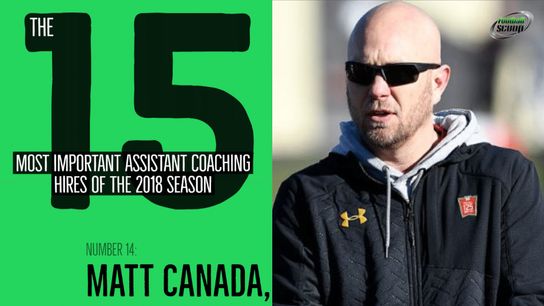“Coach (Joe) Novak, in my first meeting said to me, he said ‘Matt, you offensive guys always try to get too fancy, so just remember one thing’,” LSU's offense in the Les Miles Era was simple -- the wrong kind of simple. Opponents not only knew what was coming, they knew when, where and why. As a result, Miles was let go last September and interim head coach Ed Orgeron opted not to retain offensive coordinator Cam Cameron.
The Tigers' issues weren't an issue of talent but implementation -- their yards per play average leaped from 5.75 to 7.61 in the change from Cameron to new offensive coordinator Steve Ensminger. So when Orgeron got the full-time job in November, he turned to journeyman play-caller Matt Canada to provide a necessary, permanent update to the LSU attack.
Canada's mission? Keep it simple for his guys and complicated for the other team. "Our offense is the easiest in America," he told a gathering of coaches at LSU's annual clinic last week.
Canada's career path has taken him across America, calling plays for Northern Illinois, Indiana, Northern Illinois again, NC State and Pittsburgh before his arrival in Baton Rouge and along the way learned the strength in being simple. "Coach (Joe) Novak, in my first meeting said to me, he said ‘Matt, you offensive guys always try to get too fancy, so just remember one thing: If the play works, run it again.'" He also learned from former Colts offensive coordinator Tom Moore that Peyton Manning only read one side of the field and, in an effort to maximize efficiency, Moore kept Reggie Wayne and Marvin Harrison to one side of the field.
"We’re going to run zone, we’re going to run power. We’re going to move the pocket and throw the ball effectively, and down the field when we have to," Canada said. "We want to have plays off of plays. We want to show the defense different things the same way."
To illustrate that point, Canada asked the coaches in attendance to cross their arms, then cross their arms the other way. "Looks the same, but you feel kind of stupid, right? Not comfortable," Canada said. "That’s how we want to make the defense feel."
Canada showed the coaches the best possible example: two long touchdown runs on back-to-back snaps using the exact same play call.
In addition to varying formations, Canada's KISS offense must also switch its tempo in order to keep the defense on its toes. Like Major League hitters, opposing defensive coordinators will eventually catch on if Canada only throws fastballs or change-ups.
The end result funnels toward one, simple goal: "It’s all about players, not plays. Get ‘em the ball and let them do what they do well."
